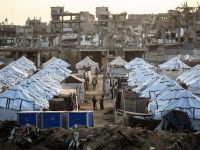By Jon Pattee
Senior English Editor
Albawaba.com
The Taliban regime’s move to outlaw poppy farming in Afghanistan could give Iran’s bloodied narcotics units a breather, drain Tajikistan’s economy, and eventually send Kosovar heroin traffickers scrambling for new suppliers.
Taliban’s housecleaning, which according to the UN Drug Control Program all but wiped out the poppy crop, will have profound implications for the world heroin trade. Only recently, the US State Department labeled Afghanistan the world’s largest illicit opium supplier, with a 72 percent market share.
But the recent crackdown has chopped that figure drastically, removing about 3,200 tons from the market so far, according to the UN Office for Drug Control and Crime Prevention (ODCCP).
Some reports say the fundamentalist Taliban leaders banned the poppy at the behest of their conservative Muslim financial backers in Saudi Arabia and the United Arab Emirates. The ODCCP, meanwhile, says the move definitely combined authentic Islamic values with a thirst for international recognition.
“Part of the process was due to the action of the UN in bringing the narcotics problem to the Taliban’s attention,” Sandro Tucci, spokesman for the ODCCP’s director general, told Albawaba.com from the agency’s Vienna headquarters.
“The UN told [Taliban] repeatedly that if they wanted to be a part of the international community they had to deal with issues such as gender, and of course narcotics,” said Tucci, who said he could not comment on whether countries like Saudi Arabia had added to the pressure.
The agency spokesman said that Taliban’s supreme spiritual leader recently reaffirmed an earlier ban on poppy cultivation, but this time involved Shura officials and regional authorities in convincing all but a handful of farmers to replace poppies with wheat.
Tucci said that “some farmers in the eastern part of the country still planted poppies, but these crops were later destroyed by the Taliban.”
A Shot in the Arm for Iran
One potential beneficiary of the Taliban poppy ban is Iran’s security force, which has seen more than 3,000 soldiers killed in the Islamic republic’s war on drugs.
A May 3 report by Newsday.com called Iran the “unwilling corridor for a crop that peaked at over 4,500 tons in 1999.” As one Western diplomat in Tehran told the online news service, “It’s a war up there, it really is. The smugglers are well-funded and they use all the latest technology. They’re ruthless.”
At the minimum, the ban could ease some of Iran’s budget burdens. A June report by Eurasianet.org notes that the Iranian Parliament recently allocated $116 million to increase security along the border with Afghanistan -- funding that might become less crucial if drug suppliers around the Golden Triangle fail to switch to the Iran route.
An ABCNews.com article recently predicted that following the poppy ban, “the center of world drug production will shift from Afghanistan…to Colombia and the Golden Triangle area on the border between Myanmar and Thailand,” raising the possibility that some drugs will find their way to customers by new routes.
But Iran will still have to remain vigilant, according to Tucci.
“We have to remember that stockpiles of raw and…semi-refined opium were already available in Afghanistan,” said the ODCCP spokesman. “We cannot assume that they aren’t compensating with those stockpiles, and meanwhile, although the price of raw opium has jumped ten-fold in Afghanistan, the price outside has remained steady, meaning they have some supply, someplace.”
“But the dynamic of this trade is such that we’ll have to carefully observe what happens in the next couple months, to see how [drug traffickers] deal with the loss of a very large source of their supplies.”
Withdrawal Symptoms for Tajikistan?
Afghanistan’s neighbor Tajikistan could be in for economic woes following the poppy ban, at least by some accounts.
A recent AIG.Online article says the flow of drugs through the desperately impoverished Central Asian nation could dry up, after having grown rapidly over the last four years. The result, according to the report, would be unemployment for thousands of Tajiks working in the drug trade. This, in turn, could further destabilize a country already ranked the poorest of the former Soviet satellite states.
Tucci, however, believes that the impact of the poppy ban will be far less than the AIG estimates.
“The two main avenues of the opium trade were west through Iran and north through Tajikistan,” said the UN agency spokesman, but he added that the ban would have no foreseeable major impact on the Tajik economy.
Tucci said the relatively low price of opium in and around Afghanistan should limit the economic consequences of the poppy ban for Afghanistan’s neighbors.
“The price of opium near the source is fairly small - we’re not talking about a large amount of money here,” said the ODCCP staffer, who estimated the entire value of last year’s Afghan poppy crop at $100-150 million.
The Kosovar Connection
Farther afield, Kosovar drug dealers may be looking for new suppliers if the Taliban decree holds, and opium stockpiles dwindle.
The Kosovars, major players in the international drug trade in the wake of the war with Serbia, have reportedly made strong inroads into Europe and the US, tapping suppliers in Asia.
"Every mafia needs two things -- a safe home territory, and a diaspora,” Xavier Raufer, a researcher at the Paris Institute of Criminology and author of The Albanian Mafia, told Agence France Presse in March. “The Albanians now have the diaspora through the refugees from the Kosovo war. Their home base is in these areas."
The Kosovar conection was recently confirmed by the San Francisco Chronicle, which reported that "Officers of the Kosovo Liberation Army and their backers, according to law enforcement authorities in Western Europe and the United States, are a major force in international organized crime, moving staggering amounts of narcotics through an underworld network that reaches into the heart of Europe.”
According to AFP, guerrillas based in a demilitarized zone on the Kosovo border last year seized control of a southern Serbian town regarded as a key depot on the route bringing heroin and immigrants from Turkey and Central Asia into Europe.
For the ODCCP’s part, according to Tucci, “We believe the Kosovars, and in general the Balkan groups, are supplied from West Asia, most likely from Afghanistan.”
However, the agency spokesman was cautious about predicting the immediate consequences of the Taliban move on drug traffickers in Kosovo and elsewhere, saying that the long-term impact on the drug trade could take various forms.
“Heroin could be less pure, the stockpiles could be used up, the prices could increase – we have to see how the market reacts,” he said.
Poppy Ban Helps Breaks the Ice with US
At least one nation has reacted very positively to the Taliban move. The US, in a break from its efforts to isolate the fundamentalist Islamic government, in April dispatched two top drug enforcement officials to join an international team visiting Afghanistan.
In the same context, the New York Times reported in late April that US Secretary of State Colin Powell had written to UN chief Kofi Annan, saying that the US was prepared to help fund a UN drug control program aimed at assisting former poppy farmers.
But even with such a program, it remains to be seen how long the Taliban movement can keep the poppy ban in place. Afghanistan’s impoverished farmers, battered by drought and decades of war, must eventually make choices whose repercussions will be felt from Iran to Kosovo, and beyond.







